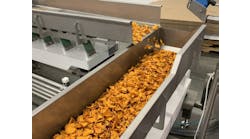Kettle Foods' plant in Beloit, Wis., is green from the ground up. The company used sustainable building practices to construct the plant, which provides operational efficiency, energy and water conservation and a smaller carbon footprint than conventional plants. And Kettle is restoring the facility's grounds to native prairie condition.
The Wisconsin plant is a vivid illustration of Kettle's commitment to sustainability and to the environment. "It's in the DNA of the company," says Jim Green, ambassador for Salem, Ore.-based Kettle Foods Inc.. "It's really part of who we are."
The 73,000-sq.-ft. facility began producing all-natural potato chips in April 2007. To build it, Kettle chose recycled and locally sourced materials. High-efficiency equipment reduces electricity and natural gas requirements, and the building's features include high-performance insulation and large windows.
That same year the Beloit plant earned a Leadership in Energy and Environmental Design (LEED) certification from the U.S. Green Building Council (USGBC). LEED certification is based on metrics such as energy savings, water efficiency, resource stewardship, and indoor environmental quality. The LEED rating levels include Certified, Silver, Gold and Platinum.
The facility was certified "as LEED Gold for New Construction," says Green. "We were the first food manufacturing plant in the U.S. — probably in the world — to achieve the gold level of LEED certification."
We went looking for a green plant and we found several; a veritable garden of environmentally sound facilities popping up like wildflowers.
Environmental consciousness on several fronts is becoming the rule in manufacturing, and the food & beverage industry is certainly doing its share. From energy savings to greenhouse gases emitted and dozens of points in between, there are many ways to contribute to a greener world. When we announced our intentions to find a Green Plant of the Year – asking for nominations via our web site back in March -- we listed several points we were looking for:
- Is it energy efficient?
- Does it use innovative or alternative sources of energy?
- It is minimally polluting?
- Does it minimize water use?
- Were green building materials and practices used in its construction?
- Is the design innovative?
- Is it economically sustainable?
And on that last point we asked for hard numbers. Actually, for all we asked for quantifiable measures.
We had about a dozen nominees by May 15, and whittled those down to four finalists. We asked you to return to our web site for a final vote, and 602 of you did (thank you all!). Kettle Foods was a runaway winner, although the other three were within a few votes of each other:
- Contessa Premium Foods, Los Angeles
- Faribault Foods, Faribault, Minn.
- Nestle Waters, Breinigsville, Pa
Following is our victory garden. While we commend the fine job Kettle did in creating an exemplary green (and LEED Gold) facility, all four deserve recognition for creating a sustainable future. So please read on to the very end to see the similarly fine jobs the other three did, and perhaps pick up some ideas you can implement in your plant. Indeed, every food & beverage processor that is in creating a greener plant is worthy of honor.
Kettle's green building and operating approach has proven to be economically sustainable as well as environmentally friendly. "There's a cost to building to the [LEED] standards, but there's also a payback to it. At the end of the day you have a building that's actually cheaper to run," Green explains.
He says USGBC's calculations indicate the Beloit plant's gas and electric energy efficiencies and water recycling provide operational savings of $200,000 per year vs. a conventionally built plant. In addition, the facility's green design makes it a pleasant and healthy place to work, thanks to attractive architecture, excellent air quality and plenty of natural light.
The facility's energy features include 18 wind turbines that generate enough power to produce 4,400 bags of Kettle Brand Potato Chips per year. At its headquarters facility in Salem, Ore., Kettle uses solar power to help satisfy its electrical needs; 600 solar panels on the roof at headquarters generate more than 120,000 watt hours of electricity annually.
Kettle buys wind energy credits to offset the remainder of the two plants' electricity use. The energy strategy is preventing 16 million lbs. of carbon dioxide from entering the atmosphere per year. The U.S. Environmental Protection Agency's Green Power Partnership program has recognized Kettle Foods as a "100 Percent Green Power Purchaser."
The company has further reduced its carbon footprint by eliminating product shipments from Oregon to the Midwest and eastern U.S. Shipping from Wisconsin (less than 100 miles from Chicago) to these locations has eliminated more than 3 million lbs. per year of transportation-related carbon dioxide emissions.
Water conservation is an additional focus at the Beloit facility, which uses more than 3 million gallons of water per year to prepare potatoes prior to cooking. "We have a system to recapture the water we wash potatoes with," Green says. The used wash water is filtered and reused for applications such as lavatory plumbing.
Taking recycling a step further, the company recycles 100 percent of its cooking oil into biodiesel fuel. Kettle collects the sunflower and safflower oil left after cooking and sends it to a biodiesel production company for processing.
The company's statistics indicate that one gallon of waste vegetable oil is produced for each 7,600 bags of potato chips it manufactures. The biodiesel company can transform each gallon of waste oil into a gallon of fuel. Kettle closes the loop by using the fuel to power its fleet of three "bio-Beetle" company cars, one of which resides in Beloit.
Recognizing the importance of the land on which the Beloit facility stands, Kettle is working with Tallgrass Restoration LLC, Milton, Wis., to restore the prairie ecosystem on the five-acre site. Kettle replanted the land with native plants in spring 2008, fostering the return of prairie flowers, grasses, animals and birds.
This past spring, the company conducted the first prescribed burn on the property to eradicate weeds and encourage new growth. From a water conservation standpoint, the restoration project packs a bonus — the restored land requires no irrigation.
In a similar project in Oregon, Kettle continues to restore the native wetlands surrounding its Salem facility. Having successfully restored its own property there, the company is now working to restore an adjacent 35,000 sq. ft. with the aid of a supporting grant from the local Marion Soil and Water Conservation District. The project includes replacing non-native plants with indigenous species such as Oregon ash and sword ferns.
The National Wildlife Federation last year recognized Kettle's sustainability and environmental restoration efforts with the National Conservation Achievement Award for Corporate Leadership.
At the product level, Kettle's commitment to the environment has led to a significant reduction of packaging materials. By removing the paper layer from its potato chip bags, the company reduced its use of packaging materials by 20 percent. According to the company, this change annually saves more than 22,000 trees and keeps more than 450,000 lbs. of packaging out of landfills.
From its focus on all-natural ingredients to the investment in prairie and wetlands restoration, Kettle holds nature dear. This approach has produced environmental benefits plus rewards in the marketplace, with "great feedback from our customer base," Green says. "It really resonates."
{pb}
The Other Nominees
We had three other very worthy projects on our ballot for Green Plant of the Year:
Contessa Premium Foods: Los Angeles
The Contessa Green Cuisine plant is the world's first "green" frozen food manufacturing plant certified by the U.S. Green Building Council's Leadership in Energy and Environmental Design (LEED) New Construction green building rating system. The plant has achieved Gold-level certification.
Using advanced design, cutting-edge technology and innovative processes, the Contessa Green Cuisine organic-certified plant operates 24/7 and reduces its daily energy use and CO2 emissions by 65 percent (relative to
1990 Kyoto Protocol baseline standards). Special features include:
- A solar-power array to reduce carbon dioxide emissions by more than 730,000 pounds each year.
- A water preheating system that takes heat from refrigeration compressors and re-uses it for boilers that cook rice and pasta, as well to preheat water for sanitation purposes.
- A loading dock that prevents the loss of refrigerated air, thereby reducing temperature fluctuation and energy use.
- Variable frequency drives to optimize the amount of power supplied to all motors.
- Using the same amount of energy, the Contessa Green Cuisine plant produces three times more product than a conventional operation.
Faribault Foods: Faribault, Minn.
Faribault Foods working with contractors designed and installed an energy-saving heat and water recovery system retrofit for our bean cannery in Faribault, Minn. The project was completed in November 2009.
Initially, the plant accounted for roughly 21 percent of the city's water use and 20 percent of sewer flow, and was one of Xcel Energy's largest-natural gas customers.
The company and its project partners developed a system to recover and reuse 100 percent of the process heat, allowing Faribault Foods to decrease its heat-energy per can by 25 percent, decrease water use by 20 percent and sewer flow by 25 percent, and account for 13 percent of Xcel Energy's business customers' natural gas savings in 2009. In addition, the system reduces the plant's water usage by nearly 100 million gallons per year. The impact of the natural gas savings accounts for a reduction of 3,030 metric tons of carbon dioxide annually, or roughly the equivalent of removing 579 cars from the road. The water savings would provide the water for roughly 4,000 average homes annually.
Project partners also included Thermo Environmental Systems, Campbell Sevey, Cedar Lake Electric, Faribo Plumbing and Met-Con Construction.
This project has been awarded:
- The 2010 Xcel Energy Efficiency Award for the largest natural gas reduction in Minnesota, a total of 38.7 percent since 2007.
- The 2010 Environmental Initiative Award for "Green Business and Environmental Management."
- The 2010 Environmental Initiative Award for "Partnership of the Year."
Nestlé Waters North America: Breinigsville, Pa.
This Nestlé Pure Life water bottling facility received the U.S. Green Building Council's Leadership in Energy and Environmental Design (LEED) Gold certification; the first food manufacturing facility in Pennsylvania to receive LEED Gold status. Thanks to its environmentally conscious design, the facility:
- Saves 9.9 billion BTUs of energy each year, which is enough energy to heat 125 homes for a season.
- Conserves approximately 220,000 gallons of water a year, which is 55 percent better than the EPA requirement.
- Reduced construction waste by approximately 75 percent, or the equivalent weight of 2,300 cars.
In addition, the facility will offset its energy usage for two years through its Renewable Energy Certificate purchase from Choose Renewables, which will allow the facility to displace its non-renewable sources of energy from the electric grid and instead fund wind power operations.
Sustainability is an integral part of Nestlé Waters' business. The company has taken steps to reduce CO2 emissions, lightweight bottles, reduce water consumption and more. To date, Nestlé Waters has the most LEED-certified facilities of any U.S. food and beverage manufacturer. The company has nine manufacturing plants with more than 3.5 million square feet designed and built to meet LEED certification.


